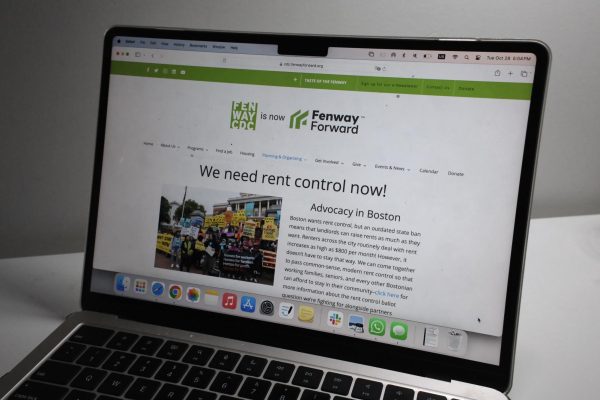As Boston students continue to grapple with skyrocketing rents, local housing nonprofit Fenway Forward is pushing for a rent control measure on the statewide ballot for 2026.

The organization is looking to collect signatures among the Fenway community in support of the initiative, which is being spearheaded by Homes for All Massachusetts, a statewide coalition of housing justice groups.
If the measure gets on the ballot, and passes, it would bring rent control back to the state for the first time since it was banned in 1994. Annual rent increases would be tethered to cost of living increases and capped at 5% each year.
The proposed measure arrives at a time when housing costs are dramatically outpacing household revenues.
Among American cities with more than 250,000 residents, Boston saw the highest average rent growth in 2025. More than half of all renters in Greater Boston remain “cost-burdened,” meaning they spend over a third of their income on housing.
While Fenway Forward has supported HFA Mass’ efforts to garner support from state legislators in past years, proposed policies surrounding rent control have stalled, said Leo Ruiz Sanchez, Fenway Forward’s lead community organizer.
“There hasn’t really been movement with rent control legislation at the Statehouse,” said Sanchez. “This year, [HFA Mass] has decided to approach the state ballot avenue to get rent control.”
According to the City of Boston’s 2023 Student Housing Trends report, high rents in Boston are partly driven by its large student population, which reached nearly 163,000 in fall 2023.
Since students typically rent with a large number of roommates, they are often able to pay a higher rent than single families.
Some students said they settled for more expensive housing due to the scarcity of available units.
“[Brokers] try to sell it to you and make it seem like it’s the last available unit or place, especially if they know you are a non-savvy, young girl,” Izzy Rodriguez, a Boston University junior living in an off-campus apartment in Allston, said. “It’s really easy to be taken advantage of.”
While her monthly rent shot up by $100 this year, Rodriguez has seen few improvements made to her unit.
“The quality of my housing is not matched with the price of my rent,” she said.
Ian Nugent, a BU junior living in Allston, said he considers his rent to be high considering his housing’s quality.
“It’s pretty inflated for college students,” Nugent added.
However, higher rents have not deterred students from flocking to off-campus apartments. In 2024, 40.5% of college students in Boston lived in private housing.
Alyssa Bergo, a BU senior living off-campus in Brookline, said BU “takes advantage” of increasing rent.
“Living on campus is more expensive than living off campus, so it kind of is unfair either way,” she said. “But when comparing it to on-campus pricing, I think you get a lot more for what you pay for.
Bergo said rent control is needed to prevent landlords from heightening costs for students.
“It’s definitely something we need badly, because all these landlords in the area of BU know that students are going to need housing,” Bergo said. “They’re going to take advantage of that. They’re going to hike up the prices more and more every year.”
Fenway Forward is working to include students in local canvassing efforts for the ballot initiative. A sign-up sheet for students has been created so students can volunteer to collect signatures.
“We do see that rent control is beneficial to everyone in the community, including students,” Sanchez said. “It would be really cool to encourage folks to sign up and do their part. It’s a way for students to give back to the neighborhood that they are in while they’re here.”




















































































































